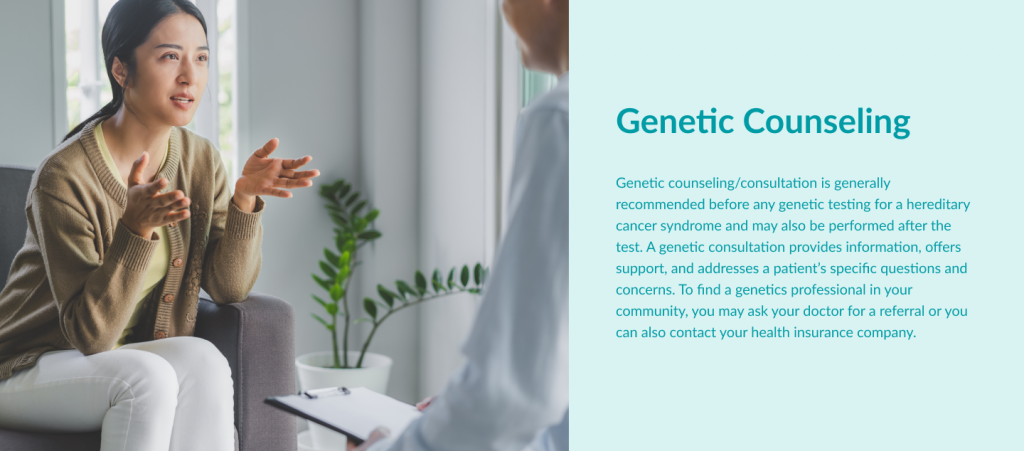
Genetic counseling is a communication process between a specially trained health professional and a person concerned about the genetic risk of disease. The genetic counselor or other health care provider will collect a detailed medical and family health history.
Genetic counseling is generally recommended before any genetic testing for a hereditary cancer syndrome and may also be performed after the test, especially if a positive result is found and a person needs to learn more about the hereditary cancer predisposition syndrome they have been found to have. During a consultation, a genetics professional meets with an individual or family to discuss genetic risks or to diagnose, confirm, or rule out a genetic condition.
Genetic counseling usually takes place in a doctor’s office, hospital, genetics center, or other types of the medical center. These meetings are most often in-person visits with individuals or families, but they are occasionally conducted in a group. Additionally, genetic consultations may be carried out using telemedicine
What Happens During a Genetic Consultation?
A genetic consultation provides information, offers support, and addresses a patient’s specific questions and concerns. Genetic counseling usually covers many aspects of the testing process, including:
- A hereditary cancer risk assessment based on an individual’s personal and family medical history
2. Discussion of:
- The appropriateness of genetic testing and potential harms and benefits of testing
- The medical implications of positive, negative, and uncertain test results
- The possibility that a test result might not be informative (that is, it might find a variant whose effect on cancer risk is not known)
- The psychological risks and benefits of genetic test results
- The risk of passing a variant to children
- The impact of testing for the family
- The best test to perform
3. Explanation of the specific test(s) that might be used and the technical accuracy of the test(s) and their interpretation
Genetic Counseling can Provide Answers to Questions Like the Following
- Do you have an increased risk for breast, ovarian, or other cancers because of your personal or family health history?
- What are the BRCA1 and BRCA2 genes and how do they relate to cancer?
- Could the breast, ovarian, or other cancers that run in your family be due to mutations in genes other than BRCA1 and BRCA2?
- What is the chance that you have a BRCA1, BRCA2, or other inherited mutation?
- If you have a BRCA1, BRCA2, or other inherited mutation, what is the chance you will get breast or ovarian cancer?
- How will the results of genetic testing for hereditary breast and ovarian cancer affect your family members?
- Who in your family should be the first to have genetic testing for hereditary breast and ovarian cancer?
- How accurate is genetic testing for hereditary breast and ovarian cancer?
- What are the possible results of genetic testing for hereditary breast and ovarian cancer and what do they mean?
- What are the potential risks and limitations of genetic testing for hereditary breast and ovarian cancer?
- How will knowing if you carry a BRCA1, BRCA2, or other inherited mutation help you to lower your risks for cancer?
- If you have already had breast or ovarian cancer, how will knowing if you carry a BRCA1, BRCA2, or other inherited mutation affect your treatment plan?
- If you have already had breast or ovarian cancer, what are the chances that you will get cancer again?
Sources:
- Adapted from NLM Genetics Home Reference: What is a genetic consultation, https://ghr.nlm.nih.gov/primer/consult/consultation, accessed on August 14th, 2020.
- Adapted from NLM Genetics Home Reference: What happens during a genetic consultation? https://ghr.nlm.nih.gov/primer/consult/reasons, accessed on August 14th, 2020.
- Courtesy of CDC: Genetic Counseling for Hereditary Breast and Ovarian Cancer, https://www.cdc.gov/genomics/disease/breast_ovarian_cancer/counseling.htm
Additional Readings:
- American Cancer Society: What happens during genetic testing for cancer risk? https://www.cancer.org/cancer/cancer-causes/genetics/what-happens-during-genetic-testing-for-cancer.html
- NLM Genetics Home Reference: How can I find a genetics professional in my area? https://ghr.nlm.nih.gov/primer/consult/findingprofessional
- NIH National Cancer Institute: Genetic Testing for Inherited Cancer Susceptibility Syndromes, https://www.cancer.gov/about-cancer/causes-prevention/genetics/genetic-testing-fact-sheet#q6

